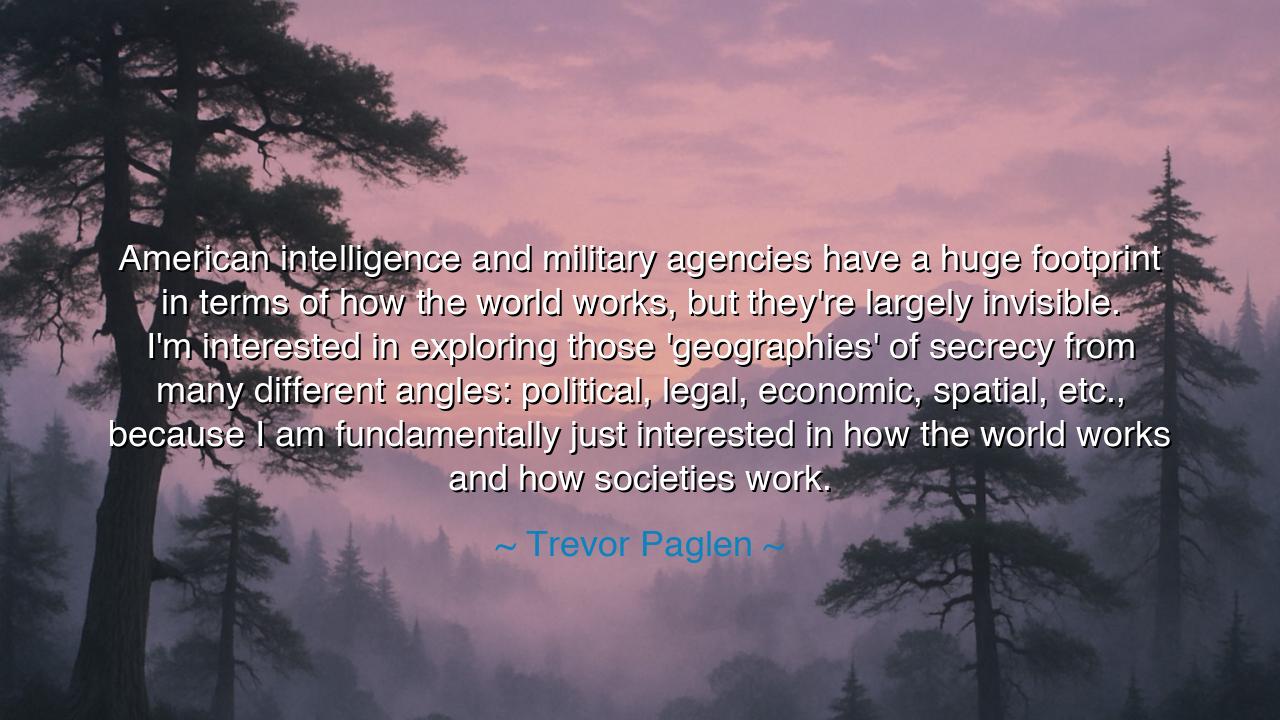
American intelligence and military agencies have a huge footprint
American intelligence and military agencies have a huge footprint in terms of how the world works, but they're largely invisible. I'm interested in exploring those 'geographies' of secrecy from many different angles: political, legal, economic, spatial, etc., because I am fundamentally just interested in how the world works and how societies work.






“American intelligence and military agencies have a huge footprint in terms of how the world works, but they're largely invisible. I'm interested in exploring those ‘geographies’ of secrecy from many different angles: political, legal, economic, spatial, etc., because I am fundamentally just interested in how the world works and how societies work.” Thus spoke Trevor Paglen, an artist and truth-seeker of the modern age—one who peers into the unseen, seeking to unveil what lies behind the walls of power and silence. His words carry the gravity of one who has wandered the boundaries of knowledge and secrecy, and who dares to ask the ancient question that has haunted all thinkers and sages: What truly governs the world? In this statement, Paglen stands as both philosopher and chronicler, revealing that the greatest forces shaping civilization often dwell in shadows, hidden not by accident but by design.
Trevor Paglen, though born into the digital and political complexities of the 20th century, walks in the footsteps of the ancient seekers—the cartographers of truth who drew maps not merely of land, but of power. His “geographies of secrecy” are not mountains or rivers, but networks of information, surveillance, and control—territories of influence that span the globe, unseen yet omnipresent. From secret military bases to data centers humming with invisible intelligence, Paglen’s quest is not simply artistic—it is moral. He reminds us that the invisible structures of government and warfare shape the destinies of nations and the lives of ordinary people, even when those people do not see or understand them.
To grasp the full depth of his words, we must remember that every age has its hidden empires. In the ancient world, kings built labyrinths and temples where their priests communed in secret, claiming divine wisdom while concealing earthly power. In Rome, the Senate’s decisions were whispered behind closed doors long before they reached the public square. And in our time, the same pattern persists—not through scrolls and seals, but through classified documents, encrypted systems, and covert operations. The forms have changed, but the principle endures: where there is power, there is secrecy. Paglen’s insight pierces this ancient veil—he sees the world not as a flat surface of nations and borders, but as a complex web of hidden infrastructures, the unseen veins through which modern civilization’s lifeblood flows.
Consider, for example, Paglen’s own work in photographing classified military sites—those forbidden landscapes where governments test technologies unknown to the public. With his lens, he captures what was meant to remain unseen: the faint glint of an aircraft in the stratosphere, the silhouette of a secret installation on the desert’s edge. In doing so, he reveals the contradiction at the heart of modern democracy—that the people are told they govern, yet they cannot see the machinery that governs them. His art becomes revelation—a form of visual philosophy, where beauty and truth converge in defiance of silence. Like the philosophers of old, Paglen does not condemn without understanding; he studies, he maps, he reveals.
His interest in how the world works is not idle curiosity; it is an act of preservation. For societies that forget to question, that cease to seek the truth behind power, become ripe for manipulation and decay. The ancients taught that wisdom begins with inquiry, and that ignorance is the surest path to tyranny. Paglen’s exploration of secrecy—political, legal, economic, spatial—is therefore a defense of the human right to know, a stand against the growing fog that separates citizens from the realities of their own governance. He is a reminder that knowledge is not only illumination—it is freedom, and that to map the unseen is to reclaim the moral compass of a society.
Yet Paglen’s work is not born of cynicism, but of wonder. He does not seek to expose the hidden world out of hatred for it, but from a yearning to understand. Like a scholar gazing at the stars, he asks what invisible forces move the heavens of our civilization—who charts their course, who benefits from their orbits, and what unseen patterns connect them. His inquiry is a call to all who value truth: to look beyond the obvious, to seek not only the visible but the underlying architecture of life itself. For only when we understand the systems that surround us can we hope to navigate them with wisdom.
The lesson, then, is as eternal as it is urgent: seek the unseen, and question the unspoken. Do not take the world as it appears, for appearances are the first veil of deception. Whether in politics, law, or daily life, remember that truth hides in the places few dare to look. Study the structures that shape your world—the networks of influence, the laws that bind, the economies that dictate your labor. Ask always, “Who decides?” and “Why?” For to know how the world works is to reclaim your place within it—not as a subject of secrecy, but as a participant in truth.
So remember, children of the digital age, the wisdom of Trevor Paglen: that the greatest act of freedom is understanding, and the greatest act of rebellion is illumination. Seek knowledge not to condemn, but to comprehend. Let your curiosity be courageous, your inquiry relentless. For the powers of the unseen are vast, but not invincible; and when humanity turns its gaze toward what lies hidden, even the deepest shadows must yield to the light.






AAdministratorAdministrator
Welcome, honored guests. Please leave a comment, we will respond soon